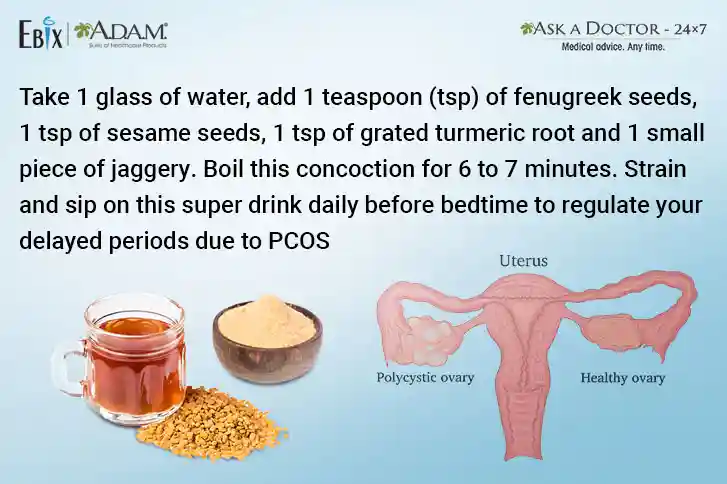Identify 4 Common Factors That Can Delay Your Menstruation Cycle
Having regular periods on the same date with a similar flow, each month, right around 28 days is a good indicator of your reproductive health. However, if you experience a delay in your each period cycle or any unusual symptoms, then it’s a matter of concern that needs prompt medical attention.
Let us read about menstruation in detail and explore some of the key reasons why a woman might have a delay in the menstruation cycle or periods.
What Does the Menstruation Cycle Mean?
Menstruation is the medical term for getting your period. It is the normal vaginal bleeding occurring once a month in women who have completed their puberty. Your menstrual cycle helps your body prepare for pregnancy. If conception is unsuccessful, the thicker uterus lining is lost along with bleeding. Bleeding typically lasts for 3 to 8 days.
A menstrual cycle can range from every 21-40 days. However, if your period doesn’t fall within this range of days, you have menstrual irregularities. It is important to know that irregular menstrual cycles affect 5%-35.6% of women depending on their age, profession, and country of residence.
Let us explore some of the key factors that are known to cause a delay in the menstruation cycle.
Common Factors That Can Cause Delay in Periods or Menstruation Cycle
Irregular or late periods can happen for many reasons ranging from hormonal imbalances to medical conditions. Enlisted below are the four common factors that primarily play a culprit in delaying the menstruation cycle:
1. Stress
Can stress really cause you to skip a period? The answer is ‘Yes’. Physical and mental fatigue, irregular life patterns (such as irregular meal times and working hours), and work-related stress can cause women to feel overwhelmed during their daily lives directly affecting the menstrual cycle.
Research shows that the risk of menstrual disorders was significantly high in women experiencing work and family stress. Over time, stress buildup can lead to illness or sudden weight gain or loss, all of which further impact your cycle.
When your body is under stress, it releases ‘cortisol’ (flight-or-fight hormone). Cortisol can make your menstrual cycle longer or shorter, or even cause a missed period. Beyond irregular periods, stress can affect your menstrual cycle in other ways like experiencing painful periods and changes in how long the cycles last.
Management of stress:
- Getting plenty of sleep
- Practicing relaxing techniques such as deep breaths, yoga, meditation, massage, etc.
- Getting regular exercise
- Talking and sharing your problems with your loved ones
- Taking time for hobbies such as reading, listening to music, or watching a movie
- Avoiding unhealthy habits such as using alcohol and tobacco
Chronic stress can also affect other health conditions you’re living with, so addressing it yourself or with the help of a medical professional is an important part of taking care of your overall well-being. You can reach us with your queries at Ask a Doctor 24x7 for online consultation.
2. Weight Changes

Living with low body weight or high body weight (obesity) can cause hormonal changes and menstrual irregularities. Obesity can cause your body to produce an excess of estrogen, an important reproductive hormone. Too much estrogen can cause your cycle to become irregular or missed, or cause heavy bleeding.
Additionally, if you lose weight too quickly like in competitive athletes, women running marathons, and in women with eating disorders may lead to irregular periods. Women require at least 22% body fat to menstruate regularly. When you lose a lot of weight quickly your body doesn't produce enough estrogen, which is needed to build uterine lining and have a period. Hence, your periods are affected if you've lost a significant amount of weight in a short period of time.
Weight management in obesity:
- Engage in regular physical activity and exercise
- Eat home-cooked, nutritionally dense food
- Avoid sugary drinks like soda, juice, etc.
- Eat more protein
- Watch portion sizes
- Eat less processed food
- Get enough sleep
- Drink more water
Weight management for women with eating disorders:
Some people find it difficult to stick to a diet and exercise plan due to an undiagnosed eating disorder. Women who are underweight may experience selective eating disorders. Women who are overweight may suffer from binge eating disorder or night eating syndrome. If you believe that you may have an eating disorder that is preventing you to gain or lose weight, seek medical help.
You can Ask a Dietician and get answers to all your queries related to weight management in minutes.
3. Thyroid issues
The thyroid gland is a small, butterfly-shaped gland, located at the base of your neck also influences your reproductive health. An overactive or underactive thyroid gland could make your periods go irregular with light or heavy bleeding. Additionally, thyroid dysfunction can also cause your periods to halt for several months or longer, a disorder called amenorrhea.
The thyroid controls our body’s metabolism, so hormone levels can also be impacted. Medication is typically effective in treating thyroid problems. The menstrual period will likely resume its normal cycle after therapy. Hence, if you experience unusual menstrual symptoms, ask your healthcare provider to evaluate your thyroid.
Management of the thyroid:
- If diagnosed with underactive thyroid (hypothyroidism), treatment involves thyroid hormone medication
- If you have an overactive thyroid gland (hyperthyroidism), you may be given medication to stop your thyroid from producing too many hormones.
4. Polycystic ovary syndrome (PCOS)

Currently, there is no treatment for PCOS, however, you can improve symptoms with dietary and lifestyle changes. Your gynecologists can help with irregular menstrual cycles associated with PCOS.
Polycystic ovary syndrome (PCOS) is a hormonal disorder in which your body produces an excess of the male hormone ‘androgen.’ This causes enlarged ovaries with small cysts on the outer edges causing irregular ovulation and menstrual irregularity. PCOS is also associated with unbalanced levels of insulin due to insulin resistance, increase weight gain, excess facial hairs, and acne.
Menstrual irregularity in PCOS includes unpredictable periods, periods with a heavy or very light flow, increased frequency of periods, or missing periods altogether.
Management of PCOS:
Lifestyle changes such as losing weight, eating a low carbohydrate diet, and getting moderate exercise for at least 30 minutes daily.
Treatment involves focusing on relieving symptoms and re-assessment of your prescribed drugs as well as birth control pills, if being used.
If you think you have any symptoms of PCOS or are at risk for the condition, it's important to see an ob-gyne sooner rather than later.
When to Visit a Doctor?
If you’ve missed your period or it’s been irregular lately and you can’t pinpoint the reasons for the delay, you should talk to your doctor. A gynecologist will be able to diagnose the cause of your irregular periods and help you develop the best treatment plan.
Consult if:
- Periods getting heavier (i.e. you require to change your pad or tampon more often than every two hours)
- Periods lasting greater than eight days
- Periods happening less than 21 days apart
- Periods coming more than two to three months apart
- Painful periods, affecting your daily activities
- Bleeding between periods
- Bleeding after sexual intercourse
Conclusion
Menstrual irregularities are not uncommon. A woman missing three consecutive periods must consult with a doctor. According to the American College of Obstetricians and Gynecologists (ACOG), your period is considered irregular if it typically occurs more frequently than every 21 days or less frequently than every 35 days. It's also considered an irregularity if your period cycle falls within the typical range but changes by seven to nine days from cycle to cycle.
For personalized medical advice regarding the irregularity of your period cycle, consult a gynecologist online at Ask a Doctor 24x7.
Recently Answered Questions Related to Irregular Periods
- What Causes Irregular Periods While Under Stress?
- Irregular Menstrual Cycle. Had Unprotected Sex. Negative Pregnancy Test. Brown Spotting After Taking Clarithromycin. Normal?
- Can Physical Stress Affect Menstruation?
- Suggest Treatment For Severe Hair Loss And Irregular Menstruation
- Suggest Treatment For Delayed Periods
- Stopped Taking Contraceptive Pills. Getting Irregular Periods, Feeling Stomach Ache, And Heavy Stomach. Pregnant?
- Irregular Menstrual Cycle. Bleeds Bright And Gets Lighter. Why Is There Weight Loss? Worry?
Ask a Specialist
Recent Questions


